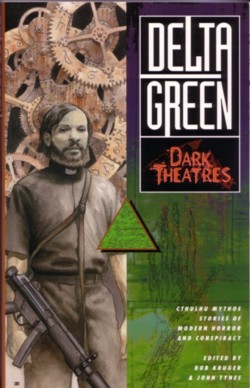Delta Green: Dark Theatres
Originally for Raw, New Things #7, 10/31/2002

Alien Intelligence, the first Delta Green anthology, was uneven although it had some real standout stories. John Tynes' novel The Rules of Engagement was a good read, which is definitely exceptional for game-related fiction. With Dark Theatres, however, either Armitage House had a better pool of stories to draw from, or they consistently have better writers send in stories.
Scott Glancy's "Once More From the Top" begins the collection, as the reminiscence of the last living marine who took part in the infamous 1928 Innsmouth Raid. Like "Shadow over Innsmouth", this is much more action oriented than most Mythos stories, involving a whole lot of gunfire, explosions, and heavy weapons. The care with which everything is handled makes the story both more compelling and more frightening that the action story it easily could have been.
"Night and Water" by Dennis Detwiller, works again one of Delta Green's favorite concepts, the Nazi occult organization, the Karotechia. Close to the end of World War Two, two old enemies meet again. The story is solidly told, and the ending is grimly satisfactory. Robert Furey's "Russian Dolls" makes the alien abductee experience even more horrifying that usual by occasionally presenting us with the thoughts of the aliens.
Greg Stolze does a fine job presenting the point of view of something that is no longer quite human in his intellectually chilling "As I See It". I can't remember having read a story that so effectively makes use of a consciousness that has transcended into something more than human.
I understand that Arinn Dembo is stripping the Delta Green out of her "Suicide Watch", and will be turning it into a novel. Sounds good to me--this novella is very strong, and takes up more than a third of the anthology. It involves a rock star who is fighting the influence of the King in Yellow. Dembo's hard, merciless prose shows us the stark horror of a man barely not a boy, who has gotten everything he ever wanted, and now needs even more that the world can give. After reading this, I never want to be famous.
John Tynes' "The Corn King" concerns Agent Alphonse, who is primarily responsible for the operation of the Delta Green conspiracy. It's a short tale, and suffers from being directly after Dembo's astonishing prose. Tynes' writing feels heavy-handed, but the story is solid. Benjamin Adams, one of the editors of Children of Cthulhu, presents us with "Good Night, Bach Ma, Good-Bye." Adams treats us to a story of alienation, and two characters who are not where they belong. It's a story of purely human consequences, of seeking a home, and the importance of roots.
The closer, Martin Cirulis's "The Fast Track", dances around one of the most disturbing ideas I've seen in a story for several years. Especially noteworthy is that this aspect is never directly told to the reader, instead we have to piece it together from various hints that the characters drop in conversation. All I can really say about this story is "eeew" and "Where can I find more of Cirulis's stories?"
Delta Green: Dark Theatres is one of three unusually high-caliber anthologies that have come out in 2002, belonging on the same shelf as Children of Cthulhu, and Dead But Dreaming. Books like these keep the Mythos a viable genre, making sure that Lovecraft's cosmic vision is neither dead nor destined for the trash heap of forgotten literature. Special Thanks to Gavin Smith for getting me both this and the H.P. Lovecraft Encyclopedia.